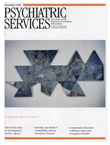Moving from psychoeducation to family education for families of adults with serious mental illness
Abstract
The number of psychosocial interventions for relatives of adults with serious and persistent mental illness has increased significantly in recent years. Psychoeducational interventions combine educational and therapeutic objectives, offering didactic material about the ill relative's disorder and therapeutic strategies to enhance the family's communication and coping skills with the goal of reducing the patient's rate of relapse. The more recent development of family education differs from psychoeducation in that its primary goals are didactic and supportive rather than therapeutic. Interventions are focused on improving family members' quality of life by reducing stress and burden and only secondarily on benefiting the ill relative. The author reviews the conceptual and empirical basis of both psychoeducation and family education, discusses the distinctions between these two approaches in program structure and effectiveness, and suggests future policy, program, and research directions for family interventions.
Access content
To read the fulltext, please use one of the options below to sign in or purchase access.- Personal login
- Institutional Login
- Sign in via OpenAthens
- Register for access
-
Please login/register if you wish to pair your device and check access availability.
Not a subscriber?
PsychiatryOnline subscription options offer access to the DSM-5 library, books, journals, CME, and patient resources. This all-in-one virtual library provides psychiatrists and mental health professionals with key resources for diagnosis, treatment, research, and professional development.
Need more help? PsychiatryOnline Customer Service may be reached by emailing [email protected] or by calling 800-368-5777 (in the U.S.) or 703-907-7322 (outside the U.S.).



